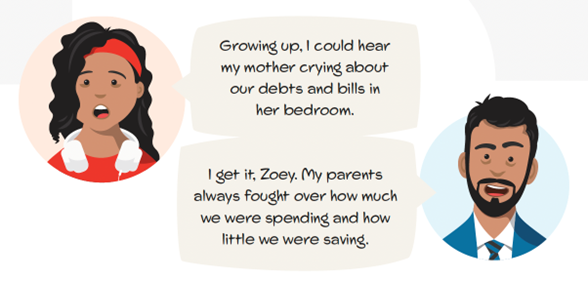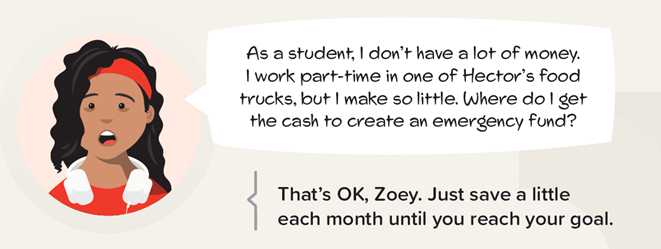The Hidden Struggle: How Financial Anxiety Is Affecting Students Everywhere
What keeps you up at night?
A national survey found that 52% of adults list money as their number one stressor. It affects people across every age group—60% of Gen Xers (ages 43 to 58) said money was negatively impacting their mental health, compared with 55% of millennials (ages 27 to 42), 52% of Gen Z (ages 18 to 26), and 45% of baby boomers (ages 59 to 77).¹
For many students, financial anxiety is a silent companion. It shows up when you're registering for classes and unsure how you’ll pay for them. It lingers when you’re choosing between textbooks and groceries, or skipping events because you're low on funds. It can look like picking up extra shifts instead of studying, losing sleep over student loans, or avoiding your bank app altogether.
What Is Financial Anxiety?
Financial anxiety isn’t just worrying about not having enough—it’s the persistent fear or stress around money, regardless of how much you make. It can stem from growing up in a household where money was always tight, where financial struggles were a daily reality and open conversations about money were rare. For many students, it also begins with taking on significant student debt before they fully understand how repayment works. And in today’s social media-driven world, it’s easy to feel like you’re falling behind your peers—watching others appear to thrive while you quietly struggle with bills, tuition, or the pressure to “have it all together.”

These layers build up, creating a constant, underlying stress that’s hard to shake.
Common symptoms include:
- Avoiding bills or your bank account balance
- Overspending as a coping mechanism
- Constantly comparing your finances to others
- Trouble sleeping, concentrating, or staying focused in school due to money-related stress
Nearly everyone worries about money from time to time, but when it becomes constant and overwhelming, it takes a toll—on your education, your health, and your future. If you’ve lost sleep over finances, felt stuck or ashamed, or avoided thinking about money altogether, you’re not alone. You’re one of an estimated 198 million American adults experiencing financial anxiety.² And unfortunately, that anxiety often prevents people from taking the very steps that would help them feel better.
You’re Not Broken—You Just Need a Plan
The good news? Financial anxiety can be managed—and in many cases, eliminated—by building clarity and confidence around your money. You don’t need to have everything figured out. You just need a place to start.
Here are three powerful steps you can take:
1. Get clear on what’s coming in and going out.
You can’t change what you can’t see. Track your income and spending for a couple of weeks. Even this small step can ease anxiety by shedding light on hidden stressors. In fact, 41% of people said that creating and sticking to a budget had the biggest impact on improving their relationship with money.³
2. Set one tangible financial goal.
That might mean saving $100 in an emergency fund, paying down a credit card, or opening a high-yield savings account. Be sure to set SMART goals—Specific, Measurable, Achievable, Relevant, and Time-Based. Instead of saying “I want to save more,” try something like:
“I will save $50 a month in a high-yield account until I reach $1,000, by cutting back on one latte a week.”

Make it realistic—and celebrate your progress!
3. Don’t do money alone. You’re not weak for needing support—you’re human.
Talk to a mentor, a financial coach, or join a community like The Lantern Network. As King Solomon wisely wrote nearly 3,000 years ago, “Without counsel plans fail, but with many advisers they succeed.”⁴ Your financial well-being is stronger when it’s supported by the wisdom and guidance of others.
Final Thoughts
Money doesn’t have to be a source of fear. With the right education, support, and strategy, you can move from anxiety to agency—one decision at a time.
At The Lantern Network, we believe understanding how money works isn’t just about dollars and cents—it’s about peace of mind. You deserve that peace. And the journey starts now.
Stay connected with The Lantern Network for thoughtful conversations, tools, and guidance around money and life after college.

Resources
Citations
- Sandberg, Erica. “Forty-Two Percent of U.S. Adults Say That Money Negatively Impacts Their Mental Health.” Bankrate, 8 May 2023.
- White, Alexandria. “77% of Americans Are Anxious about Their Financial Situation—Here’s How to Take Control.” CNBC, 29 Apr. 2025.
- Potts, Marissa Cazem. “Beyond the Budget: How Younger Generations Are Easing Stress with Financial Wellness Habits.” Intuit Blog, 10 June 2025.
- Proverbs 15:22,
The Holy Bible, English Standard Version. Crossway, 2016.




